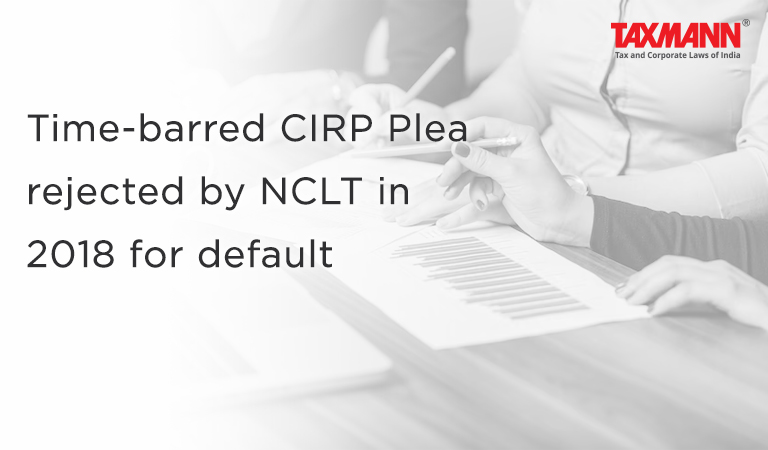Time-barred CIRP Plea rejected by NCLT in 2018 for default
- Blog|News|Insolvency and Bankruptcy Code|
- 2 Min Read
- By Taxmann
- |
- Last Updated on 15 March, 2023

Case Details: Vedika Credit Capital Ltd. v. Shriram Power and Steel (P.) Ltd. - [2023] 147 taxmann.com 384 (NCLAT- New Delhi)
Judiciary and Counsel Details
-
- Justice Ashok Bhushan, Chairperson, Dr. Alok Srivastava & Barun Mitra, Technical Member
- Akhilesh, Mratyunjay Singh , Nimit Bhela, Advs. & Kapil Kachawa, CS for the Appellant.
- Sudhir Mehta, Pandey Neeraj Rai, Ms. Rachitta Rai & Shashank Gupta, Advs. for the Respondent.
Facts of the Case
In the present case, the financial creditor entered into a loan agreement with corporate debtor on 9-4-2011. Later, the financial creditor paid amount to the corporate debtor in three tranches till 19-2-2012.
Thereafter, notice demanding repayment of loan was issued by the financial creditor to the corporate debtor. A winding up petition was filed by financial creditor on 11-11-2014 before the High Court of Kolkata and the same was pending.
Subsequently, on 12-2-2018, section 7 application was filed by the financial creditor against the corporate debtor and the same was rejected by the adjudicating authority (NCLT).
The NCLT stated that materials brought on record by the financial creditor created a shadow of doubt on authenticity of loan agreement and the financial creditor failed to produce any document which proved that transaction of repayment took place within three years immediately preceding filing of section 7 application.
Then, an appeal was made to the National Company Law Appellate Tribunal (NCLAT) against the order passed by the NCLT.
The financial creditor contended that in view of filing of winding up petition, which was pending in Kolkata High Court, financial creditor was entitled to take benefit of section 14 of Limitation Act, 1963.
It was noted that there was neither averment in section 7 application nor was any material on record before NCLT to give benefit of section 14. Hence, without there being any pleading or material, no plea for extending benefit of section 14 of the Limitation Act can be entertained.
NCLAT Held
The NCLAT observed that since foundational fact for taking benefit of section 14 was not laid down by financial creditor, benefit of same could not be claimed. Also, since date of default disclosed in section 7 application was 12-9-2014, application under section 7 having been filed in year 2018, was clearly filed beyond three years from date when cause of action arose to financial creditor.
The NCLAT held that since there was no mention of loan in balance sheet of corporate debtor, doubt expressed by NCLT was not unfounded and, therefore, the NCLT did not commit any error in rejecting section 7 application filed by financial creditor. Accordingly, the appeal was to be dismissed.
List of Cases Reviewed
-
- Order of NCLT (Kolkata) in CP(IB) No. 280/KB/2018, dated 8-10-2021 (para 17) affirmed.
- Sesh Nath Singh v. Baidyabati Sheoraphuli Co-operative Bank Ltd. [2021] 125 taxmann.com 357/166 SCL 507 (SC) (para 12)
- Forech India Ltd. v. Edelweiss Assets Reconstruction Co. Ltd. [2019] 101 taxmann.com 451/152 SCL 145 (SC) (para 16) distinguished.
List of Cases Referred to
-
- Babulal Vardharji Gurjar v. Veer Gurjar Aluminium Industries (P.) Ltd. [2020] 118 taxmann.com 323 (para 8)
- Sesh Nath Singh v. Baidyabati Sheoraphuli Co-operative Bank Ltd. [2021] 125 taxmann.com 357/166 SCL 507 (SC) (para 10)
- Forech India Ltd. v. Edelweiss Assets Reconstruction Co. Ltd. [2019] 101 taxmann.com 451/152 SCL 145 (SC) (para 16).
Disclaimer: The content/information published on the website is only for general information of the user and shall not be construed as legal advice. While the Taxmann has exercised reasonable efforts to ensure the veracity of information/content published, Taxmann shall be under no liability in any manner whatsoever for incorrect information, if any.

Taxmann Publications has a dedicated in-house Research & Editorial Team. This team consists of a team of Chartered Accountants, Company Secretaries, and Lawyers. This team works under the guidance and supervision of editor-in-chief Mr Rakesh Bhargava.
The Research and Editorial Team is responsible for developing reliable and accurate content for the readers. The team follows the six-sigma approach to achieve the benchmark of zero error in its publications and research platforms. The team ensures that the following publication guidelines are thoroughly followed while developing the content:
- The statutory material is obtained only from the authorized and reliable sources
- All the latest developments in the judicial and legislative fields are covered
- Prepare the analytical write-ups on current, controversial, and important issues to help the readers to understand the concept and its implications
- Every content published by Taxmann is complete, accurate and lucid
- All evidence-based statements are supported with proper reference to Section, Circular No., Notification No. or citations
- The golden rules of grammar, style and consistency are thoroughly followed
- Font and size that’s easy to read and remain consistent across all imprint and digital publications are applied



 CA | CS | CMA
CA | CS | CMA
